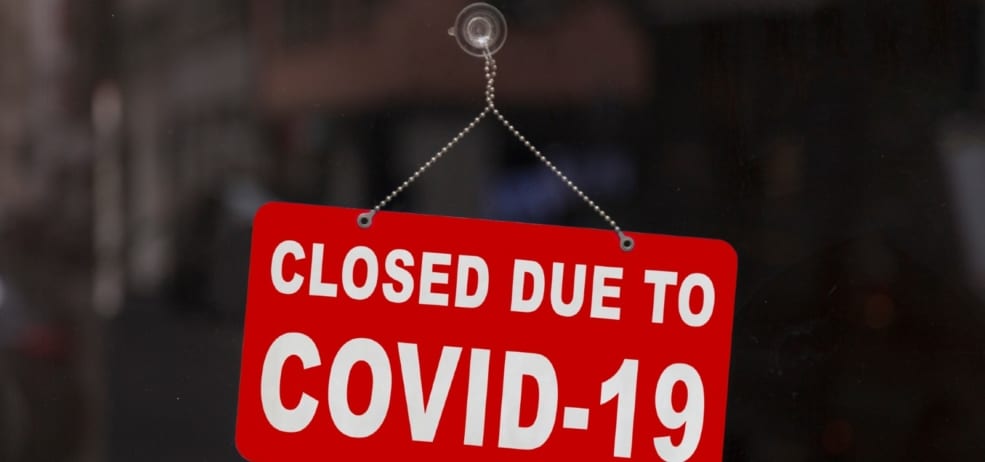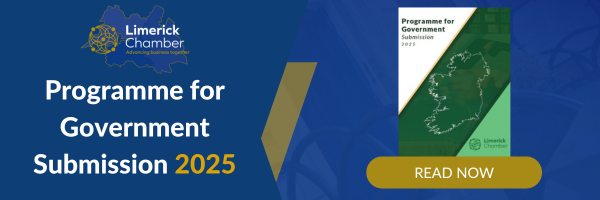Supporting Business After Lockdown: The Case for ‘Defib’ Stimulus
24th April 2020: Last Friday I participated in the Irish COVID-19 Crisis Response On-line Conference organised by the Geary Institute in UCD. The session “Exiting Lockdown – the view from the city” included Alice Charles from the World Economic Forum and Dr Philip Lawton from Trinity College, each with their own unique perspective on how cities will be impacted by COVID-19. My contribution focused on the interplay between businesses and city regions, and the policies that will potentially be needed in both the short and long term. While preparing for the session the degree to which Irish cities are severely restricted in their ability to respond to the COVID-19 crisis became increasingly evident. The question arises, ‘how best to assist businesses in the coming months?’ These restrictions stem largely from the overly centralised nature of Irish Government structures and while there will no doubt be increased debate around the topic of decentralisation and local governance in the aftermath of COVID-19, for now we must acknowledge that short term supports will continue to be controlled at the national Level.
The Government’s decision to close all non-essential business was taken on wholly justified public health grounds. To lessen the impact of these worldwide restrictions on the global economy, Governments have had to adopt both fiscal and monetary policy measures. The scale of these packages has varied significantly from country to country.
The Irish Government has so far committed a fiscal package of €7.7bn (representing roughly 2.3% of GDP) to address the impact of COVID-19. This has largely included direct transfers to households and businesses, extension of social welfare supports and other additional health benefits. The structure of the Temporary Wage Subsidy (TWS) scheme in particular is not perfect but the Government should be credited for the swift implementation of these ‘safety net’ supports. As of the 20th April, 46,000 employers have registered for the TWS scheme (representing roughly 225,000 employees). 32,000 individuals have applied for COVID-19 Enhanced Illness Benefit while 584,000 people are currently in receipt of the COVID-19 Pandemic Unemployment Payment (PUP). There are now over one million individuals in receipt of some form of social welfare support. Such a step change in the economy is clearly unprecedented.
These measures have enabled businesses to just about stay afloat, with some notable exceptions, during the lockdown period. However, additional supports will be needed before a phased reopening of the economy can be countenanced. The TWS scheme has been nominally set at three months and it is highly likely that this will need to be extended for a longer time period for some sectors (as Belgium, the Czech Republic and Australia have elected to do). The most pressing issue for Irish businesses as we exit the lockdown will be cash flow. Small businesses at any point in time might only have three to four weeks cash on hand or even less. Fixed costs (rent, utilities and the like) have continued to accrue during the lockdown period. Liquidity support therefore must be considered across three different areas:
- Grants/Compensations
The most efficient way to help small businesses in the sectors that have been locked down is through the payment of direct grants and compensation. This approach has been adopted by several countries (see Table 1). To date the Irish Government has introduced two grant schemes for small businesses that have been restricted to specific use cases. The Business Continuity Voucher worth €2,500 (available to businesses with less than fifty employees) can only be used for third party consultancy costs to develop short term and long term strategies. Furthermore, the Trading Online Vouchers worth a combined €5,000 is a scheme to assist small businesses with (less than ten employees) so that they may begin to trade online. Given that less than a third of Irish SMEs process online orders (Source: IE Domain Registry 2019) such a voucher will not assist the majority of businesses in the short term. More direct assistance needs to be considered that will enable a far larger proportion of affected businesses to address the fixed cost debts that they have accrued during the lockdown period.
Table 1: International Compensation/Grant Measures
| Denmark | Businesses that can demonstrate a loss of earnings will receive compensation in respect of 25% (for 40 – 60% loss of earnings) and 80% (for 80 – 100% loss of earnings) to cover fixed costs. |
| France | A solidarity fund will provide compensation of €1,500 to support small, independent and micro-enterprises in covering immediate cash flow |
| Germany | Small businesses will receive one off liquidity payments of €9,000 (for less than five employees) and €15,000 (for less than ten employees). |
| Luxembourg | Direct support of €5,000 for self-employed and micro-business (with less than ten employees) |
| Netherlands | Reimbursement for entrepreneurs in affected sectors (hospitality, entertainment, leisure) worth €4,000 |
| Sweden | A grant to cover between 25% and 80% of fixed costs during a three month period |
| UK | Retail & Hospitality grant scheme offering a cash grant of up to £25k per property, in addition to a Small Business Grant Scheme offering a one off liquidity payment of £10,000. |
| US | Small businesses can access a maximum grant of $10,000 ($1,000 for every employee) |
- Loans
During times of uncertainty an SME’s willingness to take on risk in the form of a loan is reduced. Furthermore, many microenterprises will have neither the capacity nor the inclination to engage with complex financial instruments in these unprecedented times. This was the rationale for the German Government’s decision to provide direct one-off liquidity payments to microenterprises. In the absence of suitable grants and compensation measures, the structure of loans becomes even more important in assisting businesses to maintain the lifeblood of liquidity.
The Irish Government has introduced a number of loan schemes that can potentially assist businesses, however the terms attached to these schemes are not as favourable as those that have been introduced in other countries (see Table 2). The first is the Credit Guarantee Scheme which provides funding of between €10,000 and €1 million over a seven year term (backed by an 80% government guarantee), however, the interest rate is set at a bank’s regular SME lending rate. Microenterprises that are not in a position to avail of bank finance can avail of COVID-19 Business Loans of up to €50,000. There are no repayments payable and the interest rate is zero for the first six months. However, after this six month window the interest rate is set at 4.5% for LEO applications and 5.5% for direct applications (with a three year term). For companies with between 250 and 500 employees and a turnover of less than €50 million the SBCI COVID-19 Working Capital Scheme provides funding that starts at €25,000 rising to a maximum €1.5 million at an interest rate of 4% (again with a three year term).
Given that Ireland last week accessed €750 million in funding at a negative yield of 0.25% there is simply no justification at present for offering loans to micro-businesses and SMEs at anything greater than zero interest rate. SMEs must be able to access the loans they need on terms that are as favourable as is practicable, (i.e. lower interest rates, longer terms), in the current climate.
Table 2: International Loan Schemes
| Belgium | Banks have to bear credit losses of up to 3% themselves. The losses between 3% and 5% are borne for one half by the banks and for the other half by the government. The losses above 5% are borne 80% by the government. The maximum interest rate for the new loans is 1.25%. Loans are guaranteed up to a maximum amount of €50 million per company. |
| Croatia | Loans up to €100,000 funded from the European Regional Development Fund at an interest rate of 0.25% (five year term). In addition, loans of up to €25,000 are provided for small businesses in agriculture, manufacturing and agriculture at an interest rate of 0.5% |
| Czech Republic | Interest free loans up to €550,000 (option to postpone instalments for up to twelve months). |
| France | Maximum loan is 25% of 2019 total revenue (state guarantee ranges from 70% – 90% depending on revenue). No principal repayment for up to twelve months (only interest payment and interest must be equal to refinancing cost of the relevant lender (i.e. no margin). |
| Germany | Unlimited loans (100% guarantee) at interest rates as low as 1%. Under its expanded “instant loan” scheme, any German firm employing between 10 and 50 people can gain credit equivalent to up to three months’ turnover, capped at €500,000. Those with up to 250 employees can access €800,000. |
| UK | UK Coronavirus Business Interruption Loan Scheme which provides twelve months interest free (3.49% – 3.99% thereafter) loans of between £10,000 and £5 million (80% government guarantee). Loans can be repaid over a period of six years and no repayments required in first twelve months. |
| US | Working capital loans of up to $2 million to small businesses and non-profits affected by the coronavirus. These loans carry an interest rate of 3.75% for small businesses and 2.75% for non-profits. Payments can also be deferred for up to four years. |
- Taxation
Currently the Government has introduced a three month deferral on VAT and PRSI. This will not provide sufficient breathing space for businesses when they reopen and as such it will be necessary to extend this deferral period by a further three to nine months. Croatia has allowed a six month deferral of income tax, profit tax and contributions on wages, however, if a company has experienced a 20 – 50% reduction in profits they can request a twenty four month payment postponement. In Sweden, the Government has deferred tax payments for a year, while the UK Government has deferred income tax payments for up to twelve months.
In the context of commercial rates the Government has only so far agreed to a three month deferral. The resistance to waiving commercial rates during the shutdown period stems from the fact that the rates form a significant part of local authority revenue (between 16% and 53% depending on the area – 33% is the national average). COVID-19 has shone a light on the weaknesses of local authority funding streams. There will no doubt need to be a review of this in the future but in the context of COVID-19 any cost associated with the waiver of commercial rates should be borne by central Government. The UK has chosen to waive commercial rates for a period of twelve months, while Singapore has implemented a commercial property tax rebate programme.
In the aftermath of the economic crisis, the Tourism and Hospitality VAT rate was reduced to 9% (before increasing to 13.5% in 2018). Given that the Tourism and Hospitality sectors have been disproportionately impacted by the COVID-19 outbreak the VAT rate should be reduced to 0% for the remainder of 2020 and set at the reduced rate of 9% in 2021. Targeted tax relief measures should also be considered by the Government. For example, Italy has introduced a 50% tax credit for sanitation costs as many businesses will required to implement potentially costly public health directives on their premises for an extended period of time after the lockdown.
In addition to the above stimuli the Government should consider some more novel options that are targeted at specific sectors of the economy. One such measure is the Retail and Hospitality Voucher that Limerick Chamber called for in our initial submission to Government five weeks ago. It was evident at the outset of this crisis that Retail and Hospitality sectors would be most impacted by social distancing requirements and the subsequent closure of non-essential business.
This scheme would entail issuing a €250 (at least) voucher to every household in the State (at an estimated minimum cost of €425 million). The voucher should be confined to the local economy, issued in small denominations (e.g. ten €25 vouchers) with each voucher redeemable at different points in time, instore and not online. This is to ensure the spending curve is flattened and the stimulus is therefore spread over a sufficiently long period of time to maximise the benefit to the local economy. Those businesses (e.g. grocery stores) that have not been adversely impacted by COVID-19 could easily be excluded from the scheme if necessary, to ensure that the support is targeted at those businesses that need it most. During times of uncertainty it is a truism that individuals tend to save rather than spend. A voucher system disincentivises the saving option and increases Government confidence that the spend will be targeted at those sectors most severely impacted. In China, several regions (e.g. Hangzhou) have implemented a e-voucher scheme through WeChat (the Chinese WhatsApp) in an effort to support the local commercial sector and boost offline consumption.
It cannot be forgotten that there are still an estimated 1.3 million people in the Irish economy whose employment has not been affected by the crisis. It can be reasonably assumed that there is some level of pent up demand in the economy. The voucher system will serve as just one release mechanism for this latent demand by encouraging individual consumption on the high street. Moreover, keeping the value of such vouchers small means there is a significant probability that the average transactional spend will exceed the face value of a voucher with individuals ‘topping up’ to pay the balance – you should think of it as going ‘Dutch’ with the Government.
The Government has indicated that the current restrictions will begin to be lifted on the 5th May. The structure of this phased exit is yet to be decided however as discussed in the previous blog there are several options that the Government can explore. No matter what form the exit takes it is evident from the above discussion that several support measures will be required to support businesses during this transition. These most notably include:
- Direct grants/compensation
- Zero or low interest loans
- Extended deferral on VAT and PRSI
- Twelve-month waiver on commercial rates
- Reduction in Tourism and Hospitality VAT rate
- Tax credits to offset sanitation costs
- Retail and Hospitality Voucher Scheme
The policy measures required to support economic growth in the medium to long term will be significantly more complex. It is likely that a targeted approach will be needed to prevent regional imbalances in economic growth from worsening – more on this in the next blog



